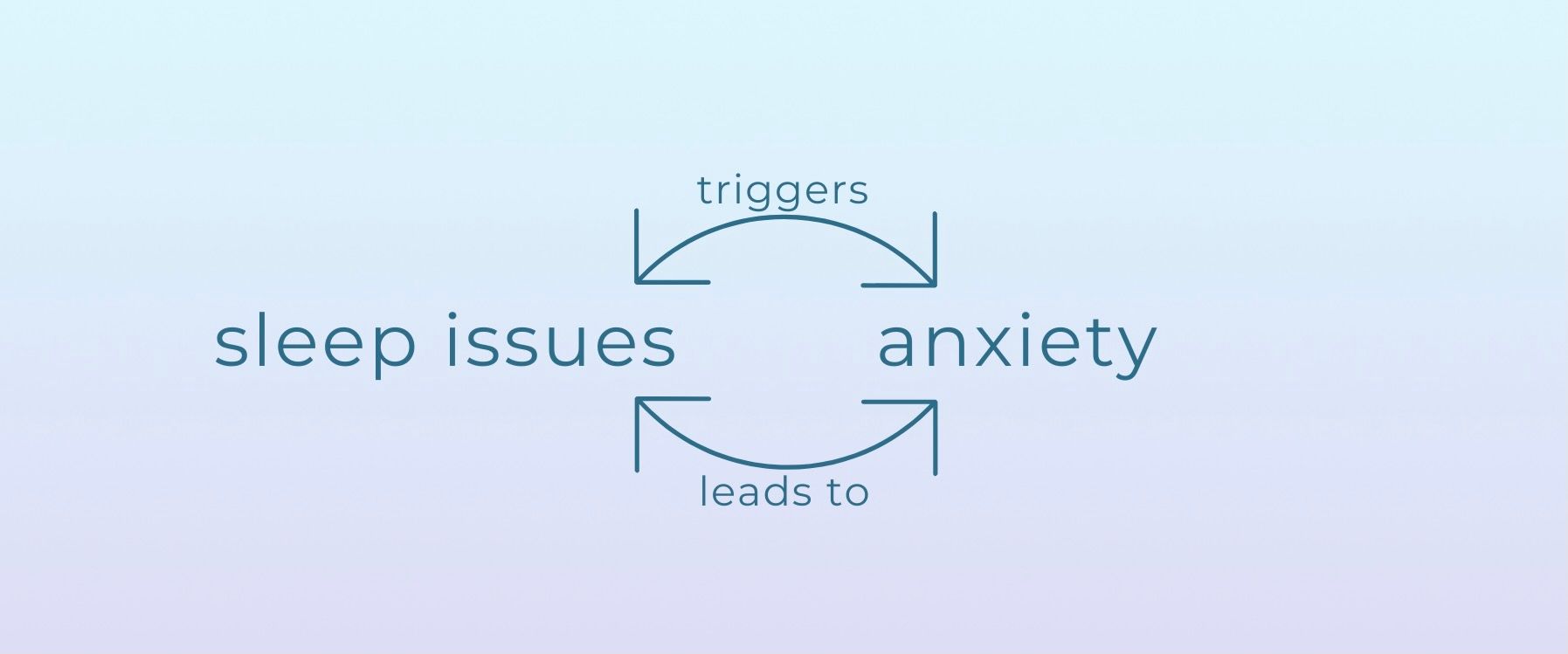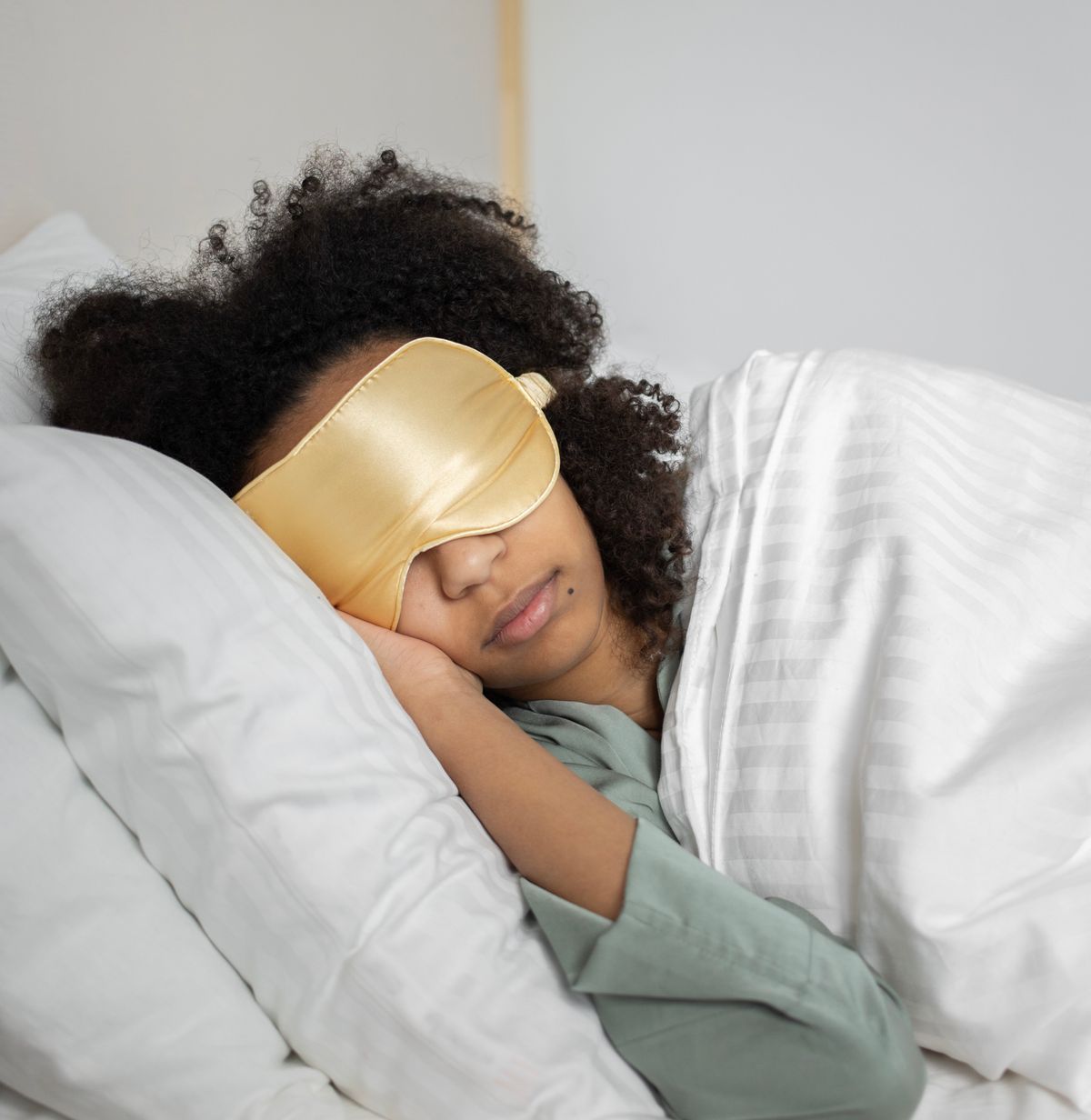Many of us could use some tips to overcome anxiety to get a better night's sleep. While we all know how crucial sleep is, allowing the body to heal and enabling us to feel at our best, so many of us still struggle to get a good night’s rest. No doubt many of us could use some tips for overcoming anxiety to get better sleep. As English novelist Charlotte Brontë once wrote:
"A ruffled mind makes for a restless pillow."
We can all relate to those worry-induced sleepless nights, where no matter how hard we try to settle, sleep just seems to elude us even more. Why then does the most natural of human needs evade us? In our hectic modern lives, which are often devoid of proper mental rest, anxiety is a major culprit.
According to research, sleep and anxiety go hand-in-hand, in what can often be a vicious cycle. Having anxiety can cause sleep issues and make it difficult to fall asleep, but the double-edged sword is that sleep deprivation can also trigger anxiety.

Why sleep is important
In his acclaimed book Why We Sleep, Professor of neuroscience and psychology, Matthew Walker, cites sleep as the single most important factor to our overall physical and mental wellbeing. More than exercise, more than diet, and even more than our economic circumstances:
"Sleep is the single most effective thing we can do to reset our brain and body health each day —Mother Nature’s best effort yet at contra-death."
Walker shows us just how detrimental consistent lack of quality sleep is to the body: “Routinely sleeping less than six or seven hours a night demolishes your immune system, more than doubling your risk of cancer.”
If sleep is so important, what can we do to improve it especially if we are prone to anxiety?
What to do when anxiety is keeping you from sleeping
These 6 tips will help you practice good ‘sleep hygiene’, so you can wind down both your body and mind more easily:
1. Get morning sunlight
2. Move your body
3. Meditate
4. Limit caffeine
5. Tailor your environment
6. Stick to a sleep schedule
1. Get morning sunlight
Rise and shine and get outside! Here at Envol, we recognise how essential sunlight is for our general health and wellbeing. This is why it is one of our 7 pillars of health. But did you know the importance of sunlight in ensuring deeper sleep?
The sunnier your day is, especially your morning, the deeper you will sleep at night. Exposing your eyes to natural light in the morning, even if just for a few minutes, can have a profound impact on your sleep. Research has shown that getting an hour of natural light in the morning improves your energy levels, alertness, and crucially, the quality of your sleep.
This is because sunlight helps regulate your circadian rhythm – signalling the body to release melatonin (a hormone released in the evening to help you feel tired and ready for sleep). The best part about this sleep hack? It’s free!
2. Move your body
Morning exercise is another free activity, which helps to kick-start your body’s sleep/wake cycle. Similar to when you expose yourself to natural light in the morning, it triggers the body to release melatonin. Not only is exercise a great stress buster, it has been shown to both lower anxiety and improve the quality of sleep, particularly for people who suffer from insomnia.
It’s important not to exercise too close to bedtime though, as this can keep you awake. A morning or afternoon workout is ideal to help get your sleep/wake cycle back on track. At the very latest, be sure to get your workout in at least 3 hours before you hit the hay.
3. Meditate
Decreased anxiety is a major, science-backed, benefit of meditation. Studies have also shown that meditation can help reduce cortisol, which is the hormone associated with stress. Meditation also increases melatonin levels, which we know promotes restful sleep.
Additionally, research has shown that diaphragmatic breathing relaxation techniques can lead to significant reductions in anxiety before bedtime. Luckily, here at Envol, we’ve got you covered when it comes to both meditation and breathwork!
Our Envol toolbox not only features meditations designed specifically to ensure you get the best night’s sleep possible, but also has a dedicated breathing section, with a customizable timer. Our guided breathing exercises are the perfect antidote to those moments when you’re feeling anxious or overwhelmed, especially if you’re looking to relax and unwind before bed.
4. Limit caffeine
While it’s obvious drinking caffeine too late in the day inhibits sleep, did you know just how truly disruptive this can be? Walker warns of the perils of this all too common, culturally accepted habit:
"Caffeine has an average half-life of five to seven hours. Let’s say that you have a cup of coffee after your evening dinner, around 7:30 p.m. This means that by 1:30 a.m., 50 percent of that caffeine may still be active and circulating throughout your brain tissue."
Not only this, but the link between caffeine consumption and anxiety is unequivocal. Caffeine stimulates the ‘flight or fight’ response in the body. Research has shown that not only can this make anxiety in general worse; it can even trigger an anxiety attack. Just another reason to curb that afternoon coffee habit!
Being stimulants, chocolate and nicotine are other lesser-known culprits to watch out for when it comes to sleep disruption. So try to limit their intake before settling in for the night.
5. Tailor your environment
Controlling factors in your bedroom like light, sound, and temperature, can have a profound impact on your chances of getting a good night’s rest. An ideal sleep-friendly environment should be cool, dark and quiet, and free from distractions like TVs or a computer. This kind of sleep setting helps to calm your mind, allowing you to fall asleep more easily.
Speaking of electronics, blue-light from devices such as phones and computers, has been shown to significantly affect your sleep cycle (by suppressing the production of melatonin). Try swapping your phone for a good book! If you must use electronics before bed, be sure to invest in blue-light blocking glasses to help mitigate the effect.
Disconnecting from all forms of technology (preferably at least two hours before bed) is a crucial component to a good night’s rest. If your night-time routine involves relaxing with one of our Envol meditation tracks, we have a feature that allows you to pre-download your chosen track (so that you don’t have to be online), making switching off from technology for the night and winding down that bit easier.
6. Stick to a sleep schedule
A regular sleep schedule is highly beneficial for both falling asleep more easily and feeling better throughout the day. As tempting as it might be to have that weekend lie-in, try to avoid waking up later than you typically would during the week. Going to bed and waking up at the same time every day, even on weekends, prevents your all-important circadian rhythm for being thrown off balance.
Contrary to popular belief, attempting to “catch-up” on missed sleep at the weekend may produce the opposite of the desired result. In his book, Walker warns that this can, in fact, induce feelings of physical and mental fatigue, which he refers to as ‘social jetlag’.
Walker writes that in doing so, you are essentially “torturing your biology”, because you are doing the equivalent of flying in and out of different European times zones every week. Moral of the story: maintain a consistent sleep schedule -your body will thank you!
Envol can help
We all know that the more relaxed we feel, the better we sleep. Fortunately, Envol offers you many tools to allow you to access deep states of relaxation, to help promote restful sleep. Our Envol toolbox is brimming with an array of wonderful meditations, which are perfect for alleviating anxiety and helping the body and mind to relax and unwind.
Whether you have trouble falling asleep, or if you struggle to get back to sleep after waking up during the night, we have something to ease all your sleep woes.
In fact, our Deep Sleep meditation was designed specifically with this purpose in mind. It is perfect to listen to both prior to sleep, or during the night to help you go back to sleep. One Envol user writes:
"I use this every night before I go to sleep. If I wake up in the middle of the night, I play it again to go back to sleep. It’s a staple meditation for me."

For those moments, when you’re feeling frazzled and overwhelmed, our Rest the mind meditation is the perfect pick! This advanced meditation will shift your nervous system into a parasympathetic state in which deep regeneration and relaxation can happen.
"I did this meditation and I had 9 hours of uninterrupted sleep. The best meditation to rest your mind and get into parasympathetic state."

Last but not least, our Rescue meditation is like a hug for your nervous system – a slow and deeply soothing meditation designed to ease feelings of overwhelm, anxiety or pain. It's an ideal listen before bedtime to help curb any anxious thoughts that might keep you tossing and turning.
"My go-to meditation when I experience high anxiety around my health."

Takeaway
Here at Envol, we take sleep seriously. As one of our 7 nourishments, we believe it is a foundational part of any effective approach to optimal wellbeing. By ensuring you prioritise your sleep hygiene, you can reap the rewards of waking up feeling refreshed and ready for your day. Not only that, but you can look forward to sustained energy throughout your day and a lot less anxiety too!
Want to explore more health and wellness content? Read some of our other amazing articles below:


